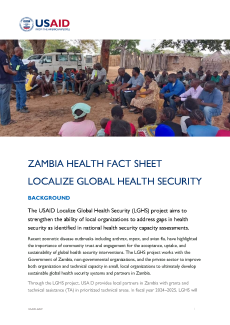The USAID Localize Global Health Security (LGHS) project aims to strengthen the ability of local organizations to address gaps in health security as identified in national health security capacity assessments.
Recent zoonotic disease outbreaks including anthrax, mpox, and avian flu, have highlighted the importance of community trust and engagement for the acceptance, uptake, and sustainability of global health security interventions. The LGHS project works with the Government of Zambia, non-governmental organizations, and the private sector to improve both organization and technical capacity in small, local organizations to ultimately develop sustainable global health security systems and partners in Zambia.
Through the LGHS project, USAID provides local partners in Zambia with grants and technical assistance (TA) in prioritized technical areas. In fiscal year 2024–2025, LGHS will award three to four grants to local organizations to address zoonotic disease through risk communication and community engagement, community-based surveillance, and One Health workforce development. One Health recognizes that the health of people, animals, and the environment are interconnected.
GOALS
GOAL ONE
Address critical gaps in health security through grants and technical assistance in prioritized technical areas.
GOAL TWO
Strengthen the administrative and financial organizational capacity of local entities to effectively manage the implementation of health security technical interventions.
GOAL THREE
Expand the global knowledge base of approaches and best practices for local entities conducting global health security interventions
ANTICIPATED RESULTS FOR 2024
- Award three to four grants to local organizations to address zoonotic disease through risk communication and community engagement, community-based surveillance, and One Health workforce development.
- Each grantee will integrate up-to-date best practices in their programming to sustainably continue global health security work.

